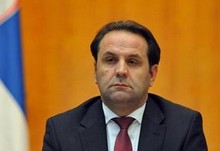- Serbia
Get to know Serbia
- Citizens
Culture and science
Health services
Pension and disability insurance
- Business
Employment
Economy
- Media
- Government
- Contact
Keep in touch
Contact form
Back
Keepin touch
Whether you have a question, comment, suggestion or any problem in the purview of the government, send us your message and we will try to respond as soon as possible. If your problem is not in our purview, we will forward your message to the relevant institution.
Q:
A:
Initiative for Serbian nationals convicted in ICTY to serve sentence in Serbia
Belgrade,
2 December 2012
Deputy Prime Minister and Minister of Foreign and Internal Trade and Telecommunications Rasim Ljajic said that Serbia will again initiate the procedure before the International Criminal Tribunal for the Former Yugoslavia (ICTY) and the UN, asking that its nationals who were convicted in The Hague serve sentence in Serbia.
Ljajic, who is also chairman of the National Council for Cooperation with the Hague Tribunal, explained in an interview with today’s edition of daily Vecernje Novosti that a formal decision on this has to be made by the UN Security Council which founded the Hague Tribunal, but that the Tribunal must also give its opinion.
In the last few years this has been a constant topic in all our discussions with representatives of the Hague tribunal – both the court and the Prosecutor's Office, he said, and recalled that the UN Secretary General made a recommendation in 1993 according to which the convicts should not serve their sentences in the countries of the former Yugoslavia, because then it was war time.
That, he said, to some extent, was logical in the post-war period as well, due to consequences that were still fresh.
However, the National Council for Cooperation with The Hague Tribunal repeatedly wrote to UN Secretary General Ban Ki-moon and urged that Serbia be inscribed on the list of 17 countries that signed an agreement with the Hague Tribunal on the serving of sentences.
He said that until recently, when some of the Hague fugitives were still at large, the response was that Ratko Mladic and Radovan Karadzic must be arrested first.
When this issue was raised after their arrest, a new answer arrived that the convicts would be treated as heroes in Serbia and would serve their sentence in privileged conditions, Ljajic said.
In the last few years this has been a constant topic in all our discussions with representatives of the Hague tribunal – both the court and the Prosecutor's Office, he said, and recalled that the UN Secretary General made a recommendation in 1993 according to which the convicts should not serve their sentences in the countries of the former Yugoslavia, because then it was war time.
That, he said, to some extent, was logical in the post-war period as well, due to consequences that were still fresh.
However, the National Council for Cooperation with The Hague Tribunal repeatedly wrote to UN Secretary General Ban Ki-moon and urged that Serbia be inscribed on the list of 17 countries that signed an agreement with the Hague Tribunal on the serving of sentences.
He said that until recently, when some of the Hague fugitives were still at large, the response was that Ratko Mladic and Radovan Karadzic must be arrested first.
When this issue was raised after their arrest, a new answer arrived that the convicts would be treated as heroes in Serbia and would serve their sentence in privileged conditions, Ljajic said.
-
 Belgrade/Brussels, 19 November 2025
Belgrade/Brussels, 19 November 2025European integration shared responsibility of entire society
-
 Belgrade, 29 October 2024
Belgrade, 29 October 2024State moves to minimise advertising for betting shops
-
 Belgrade/Berlin, 28 January 2016
Belgrade/Berlin, 28 January 2016Fences cannot stop migrations
-
 Belgrade, 7 January 2016
Belgrade, 7 January 2016Serbia to experience dynamic economic growth in 2016
-
 Belgrade, 31 December 2015
Belgrade, 31 December 2015Serbia will persevere on path of development, reforms
-
 Belgrade, 30 December 2015
Belgrade, 30 December 2015Ground for Serbia’s progress set
-
 Belgrade, 28 December 2015
Belgrade, 28 December 2015Serbia ready for improvement of cooperation with Russia
-
 Belgrade, 22 December 2015
Belgrade, 22 December 2015Serbia ready to open six more chapters next year
-
 Belgrade, 21 December 2015
Belgrade, 21 December 2015Serbia to be part of EU by 2020
-
 Belgrade, 20 December 2015
Belgrade, 20 December 2015Serbia ready for EU membership by 2019

